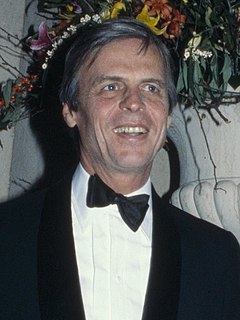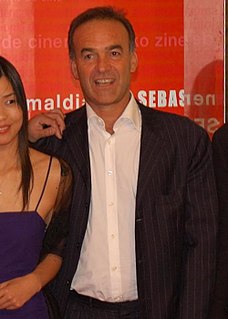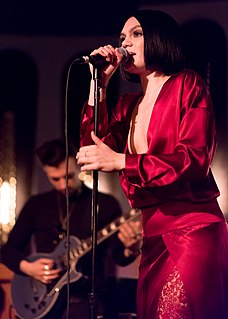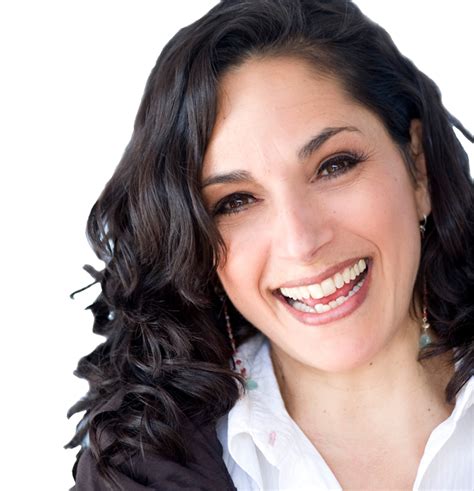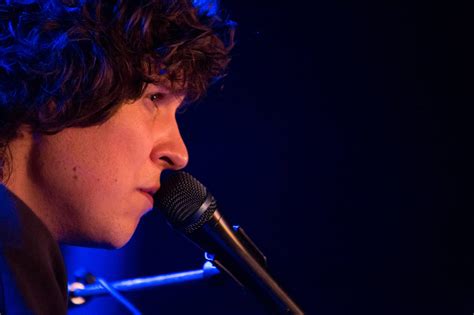A Quote by Russell Crowe
To be honest, when you're younger and cooler, you say those sort of things don't mean anything, but then on the day when they pat you on the back and they say, "Look, mate, we're noticing what you're doing-thanks very much;' you think of the people who spent a life in the cinema and didn't receive that kind of accolade, and it's sort of a humbling experience. And it's very nice and all that. But it doesn't change the way I do things.
Related Quotes
I read a ton of nonfiction. I tend to read about a lot of very extreme situations, life-or-death situations. I'm very interested in books about Arctic exploration or about doomed Apollo missions. I tend to read a lot of nonfiction that's sort of hyperbolic and visceral. And then I kind of draw on my own personal experiences and my own sort of generic life experience, and I kind of try to feed my day-to-day reality that I have with sort of high stakes reference points that I read about. They're things everyone can relate to.
You know so many documentaries now are very carefully scripted before you start, and then people are sort of put in chairs which are beautifully lit, and they tell their stories and you do that with another 10 people and you then construct a story from what they say. You do a sort of paper thing, and then you put some images in-between, and that's your film. And that's so not what I think is a good documentary. It can be so much more than that, it should be much more of an adventure and much more uncertain... like real things are.
I am a very honest person, and I can only say there are moments in my life where I really did think I was being me in the sense of my morals and beliefs and the way I acted. But when I look back at certain things that I wore and my hair and make-up, I was like, 'Whoa! That wasn't me!' But I didn't know it back then.
People from my first home say I'm brave. They tell me I'm strong. They pat me on the back and say, 'Way to go. Good job.' But the truth is, I am not really very brave; I am not really very strong; and I am not doing anything spectacular. I am simply doing what God has called me to do as a person who follows Him. He said to feed His sheep and He said to care for 'the least of these,' so that's what I'm doing, with the help of a lot people who make it possible and in the company of those who make my life worth living
There seems to be something in the zeitgeist, and maybe it's a function of - I'm no analyst, nor am I a psychologist - when you look at things and say, What if I could go back and change things? I think we live in a world right now where people are asking those questions a lot. What if we could go back and change what we did? How would we change the way we handled things in the Middle East, and how would we change things with the banking industry, and how would we change economic and educational issues?
I say the elite looks out of touch because it's kind of saying; look we'll manage all this for you. You know, we know best. We'll sort it all out for you. And then because people believe that doesn't meet their case for change and they want real change, social media and the way the relationship between people can come into a sense of belonging very quickly, that then is itself a revolutionary phenomenon. You see this around the world.
It's very hard, I think, for critics to write positive reviews, because there's not that much to say about something you like. You can kind of say 'I really like that band' and then if you're forced to fill up the rest of an article, you've got to start saying heady things. It's much easier to say negative things in a review.
You start noticing that people are noticing how you look, and it is a profoundly alienating experience when it first happens, where you go on TV and you say something about some topic of the day, and on the Internet people are like, 'What was up with that shirt?' 'What was up with your hair?' And you think, 'Oh, that's kind of a bummer.'
I am sure," cried Catherine, "I did not mean to say anything wrong; but it is a nice book, and why should not I call it so?" "Very true," said Henry, "and this is a very nice day, and we are taking a very nice walk, and you are two very nice young ladies. Oh! It is a very nice word indeed! It does for everything. Originally perhaps it was applied only to express neatness, propriety, delicacy, or refinement—people were nice in their dress, in their sentiments, or their choice. But now every commendation on every subject is comprised in that one word.
There were choices that we've made as a Little Dragon, that we had to make at the time because we needed the money. I think everything has its context. It is way easier to say no to things now then it was five years ago, for sure. Back then we were grabbing at every opportunity we could just to sustain a name and let people know, "Hello, hello! We're here! Look at us!" It's really sort of taken its time and grown, and it's been a very step-by-step process.
I mean, in many ways, you know, I felt very connected to Ian (Dury) on, on a lot of levels. I mean, politically, & sort of, socially, our, kind of, social backgrounds are quite similar in many ways, as well as our kind of artistic endeavors. So there were many, many things that sort of chimed in for me, and kind of made me feel very instinctive about playing him, and, and although, there was sort of a certain amount of impression involved, actually, there's a lot of myself in the role.
Looking back on my whole experience, the biggest takeaway was just being proud of what you do, and knowing that it's okay to do your best even if it's not the best. That's sort of the theme. I mean, obviously I'm not the best singer, obviously I'm not the best piano player or the best songwriter, but I'm doing my best on all of 'em. Once you have all those things in place, then I think everything falls the way it should.



